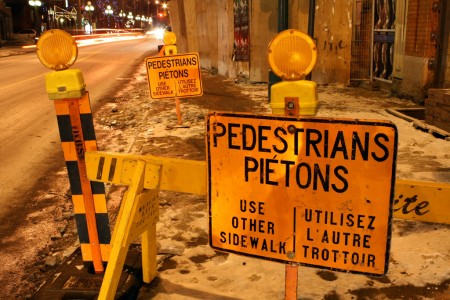Climate change is not the only threat to humanity that the United Nations has been called upon to deal with. Another risk that bears consideration is that of the inevitable collisions that will occur between our planet and other big rocks in space. A group called The Association of Space Explorers has raised the issue recently, arguing that the near pass of Asteroid 99942 Apophis in 2036 should prompt some coordinated global thinking on appropriate responses to possible impacts. Their report refers the the Tunguska event of 1908, a three to five megatonne explosion which started fires large enough to engulf New York City. Apophis has a 1-in-45,000 chance of striking the Earth, but would generate a 500 megatonne blast if it did so. On an astronomical timeline, it is inevitable that an object of this magnitude will eventually strike the Earth.
The group has released a fifty page report entitled Asteroid Threats: A Call for Global Response (PDF). It covers both some technological options for deflecting incoming asteroids and decision-making processes through which such plans could be put into action. It makes a strong case that the probability of successful deflection is much higher if action is taken early. An extension of that is the need to take decisions before it is certain a collision will occur: a situation that significantly increases the probability that such a decision will need to be made within the foreseeable future.


I thought the universal assumption was that the United States will deal with any asteroid problems.
Of course, they are feeling a bit overstretched, these days.
Watching and waiting
Dec 4th 2008
From The Economist print edition
The search for dangerous asteroids is about to begin in earnest
Taking asteroids seriously
By Phil Plait
“But in the past couple of weeks there’s been a resurgence of interest. Of course, having three big, bright fireballs lighting up the skies recently didn’t hurt: the one in Darfur months ago, or the one in Canada weeks ago, or the one in Colorado the other night (which I missed, dagnappit!). Maybe it was the publishing of a brilliant book with a whole chapter dealing with asteroid impacts. Hard to say.”
“Even a rock 50 meters across could take out a city, exploding high in the atmosphere and generating a devastating shock wave and fireball. But it’s literally impossible to find asteroids that small very long before impact. 150 meters or so is a reasonable size to find, and that’s also about the size where they start doing damage on a large scale.”
Earth under threat from dark comets
By Heather Catchpole
“But dark comets with unpredictable orbits may pose a greater threat than asteroids, which are easier to spot, according to astrophysicists Bill Napier, from the Cardiff Centre for Astrobiology in Wales, and David Asher, from Armagh Observatory in Northern Ireland.
“We may be dealing with a population of dark objects, carrying a lot of kinetic energy, which are not being properly picked up in the Spaceguard surveys,” the researchers write in the February issue of the journal Astronomy & Geophysics.”
Space rock makes close approach
An asteroid which may be as big as a ten-storey building has passed close by the Earth, astronomers say.
The object, known as 2009 DD45, thought to be 21-47m (68-152ft) across, raced by our planet at 1344 GMT on Monday.
Asteroid Apophis Could One Day Hit Earth. Here’s How We Could Get to It First